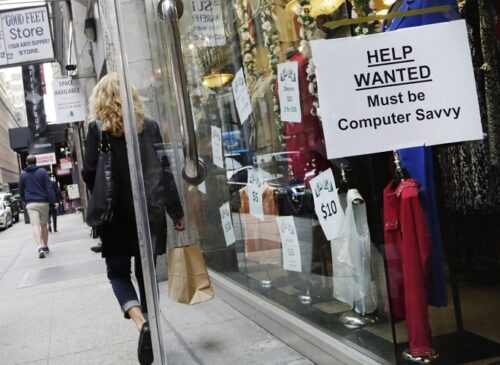
Oklahoma has been ranked as the fifth-highest state in the country in job resignation rates, according to a national personal finance company.
The state had 3.4% of workers leave their jobs last month and 3.06% of workers leave their jobs in the last year, according to WalletHub.
“The U.S. experienced a phenomenon dubbed the ‘Great Resignation,’ where millions of Americans quit their jobs each month, many of whom were unsatisfied with their pay or working conditions,” WalletHub said in its analysis published last week.
“Although most experts have now declared the Great Resignation over, workers in some states are quitting their jobs more frequently than in others. As a result, workers in states with a bigger labor shortage have more leverage in negotiating favorable terms of employment,” the company said.
“The Great Resignation can partially be attributed to the significant decline in labor force participation during the pandemic. This led to increased competition among employers for a reduced workforce, giving employees leverage to secure jobs with better compensation or other advantages over their current roles,” said Victoria Prowse, a professor of economics at Purdue University who was cited by WalletHub.
“One of the major factors influencing the shift in the labor force is the influence of feelings on work ethic,” said Matt Fuss, associate professor of management and human resource management at Geneva College, a private school in Beaver Falls, Pennsylvania. He was also cited by WalletHub.
“We have moved from ‘living to work’ to ‘working to live’ to the current state of ‘living only if work matters.’ Younger people today must feel an emotional connection to their work and have been programmed to believe that every job must have a specific measurable effect on making the world a better place,” he said.
Meanwhile, Fuss said, employers are being forced to increase their wages and decrease services and hours. The increase in wages is also forcing a rise in consumer prices, which pushes demand down, creating “a bad cycle of less demand for more expensive products.”
“Employers are having to make tough decisions around reducing workforce numbers, cutting hours and/or limiting services. All of these things further alienate their customers.”
Despite the WalletHub ranking, Oklahoma’s unemployment rate remains at record-low levels.
The state’s seasonally adjusted rate was unchanged at 2.7% in July, matching a low set in June, the most recent figures available, according to the Oklahoma Employment Security Commission.
The U.S. unemployment rate moved down 0.1 percentage point to 3.5% in July.
https://omny.fm/shows/pennywise/playlists/podcast/embed?style=coverListen now and subscribe: Apple Podcasts | Google Podcasts | Spotify | Stitcher | RSS Feed | Omny Studio
“There are a lot of things to be learned from the pandemic and what it did,” said Stephen Dubner, co-author of “Freakonomics,” at the recent OSU Future of Work Summit.
“Even though there were some positives in the innovation or productivity space during COVID and the shutdown — there were more startups for instance — a lot of that was just because of necessity.
“But one thing that you saw a drop in was general productivity, especially as it concerns innovation. And I think what that means is that there are good things that happen when people get together in person. There are also bad things, but there are a lot of good things.
“If I have an idea that’s the beginning of a good idea, but I can’t get it further, but I talk to you just at the water cooler, or at lunch or in the elevator, ‘What are you working on?’ ‘I’m working on this.’
“’That’s not what I’m working on but I’m wondering if you might know anybody who’s related to that.’ And that kind of thing, weirdly to me, still happens much more in person.”
“Communication between humans in person still happens at a much richer level than any digital communication,” Dubner said.
“Where we work, how we work, has changed a lot over the past three years, over the past 20 years, over the past 100 years, obviously.”
While factors such as pay, culture and work flexibility are important, he said, the true answer as to why employees stay in their jobs longer and are more productive is “whether or not their immediate boss is a jerk.”
